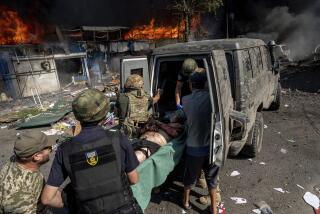Nasty War’s Nasty Question: Is West Blinded by Religion? : Muslims fear big powers will accept slaughter of non-Christians in Bosnia
- Share via
Are the major powers, or at least some of them, more tolerant of genocide against a Muslim minority than they would be of the same against a Christian minority? This suggestion, long whispered in connection with the slaughter of the Bosnian Muslims, is being spoken aloud since former President Richard Nixon included it in a book completed just before his death.
It cannot be claimed, as the Muslim Public Affairs Council did two weeks ago, that the “United Nations is effective only when it acts against Muslims.” (After the rape of Gorazde, the council called on Muslim countries to withdraw from the United Nations.) To mention the U.N. rescue of Muslim Somalia from famine and anarchy is to refute that claim, and other instances could be named.
But Muslim distress over Bosnia is steadily rising. Secretary of State Warren Christopher faced an angry delegation of all six foreign ministers of the Gulf Cooperation Council last week, frustrated that their lobbying for bolder U.S. action has failed.
In the United States, which has a relatively small Muslim population, there is virtually no history of major domestic problems involving this minority; foreign conflict, such as with the Iraqi dictator Saddam Hussein, has never been with Muslims as such. Bosnian leaders have occasionally named American religious pluralism as the reason that the United States has ended up as the Bosnian Muslims’ least weak defender. Differing histories may be a better key. Virtually all of Europe’s historic victories were over Muslims. This is not to say that the greatest battles in European history were fought against Muslims. But on the rare occasions when Europeans were not fighting one another but were fighting as Europeans against a non-European enemy, that enemy was Muslim. Charles Martel stopping the Moors at Tours, France, in 732; Roland, slain fighting the Saracens in the Pyrenees; El Cid, continuing the epic reconquest of Spain in the 11th Century; John of Austria and his European armada destroying the Turkish fleet at Lepanto off the coast of Greece in 1571; Sobieski of Poland, stopping Muslims at the gates of Vienna in 1683--these are heroic names and fabled places that every European schoolchild memorizes.
Do the memories matter in 1994? Do they bear on relations between the British and their Pakistani minority, the Germans and their Turks, the French and their Algerians, the Spanish and their Moors, the Russians and their Central Asians? And are Europeans likely to be affected by this broad cultural background as they view the Serb Christians fighting the Bosnian Muslims?
To the Serbs, their epic resistance against the Turks at Kosovo Polje in 1389 was as important for Christendom as was Tours, and the national epic that celebrates it is as immortal as the “Chanson de Roland” or “El Poema del mio Cid.” But the Serbian national epic has been generally ignored in the West and scarcely celebrated in Russia.
In looking at the continuing dithering of the West, many in the Muslim world see a rising question of whether a non-Christian minority is to be considered expendable. As this war drags on, the question looms ever larger; and the question in itself is of consequence. Christians and Muslims are fighting each other in disturbingly many places around the world, sometimes with words, sometimes with guns: Sudan, Lebanon, Armenia/Azerbaijan, Cyprus, Egypt, Pakistan and elsewhere. Some students of foreign affairs--notably Samuel P. Huntington writing in Foreign Affairs last summer--see the re-emergent Islam/Christendom line as a kind of new cold war divide.
If a new condition rather than a new superpower threatens world peace, that condition surely must be (or include) bloody intra-national competition among ethnic and religious groups. In that context, past history and present sociological reality in Europe make Bosnia seem a more fateful conflict than ever and one that may require the major powers to examine themselves as closely as they do the combatants clashing in the Balkan hills.
More to Read
Sign up for Essential California
The most important California stories and recommendations in your inbox every morning.
You may occasionally receive promotional content from the Los Angeles Times.













